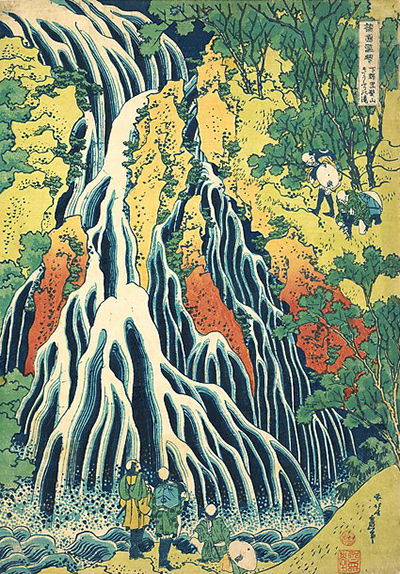Hokusai
Kirifuri Waterfall at Kurokami Mountain in Shimotsuke
The Japanese artist and printmaker, Katsushika Hokusai, painted Kirifuri Waterfall at Kurokami Mountain in Shimotsuke during 1832. This waterfall painting was created during the Edo era between 1760–1849. Katsushika Hokusai was an influential and leading artist during his artistic lifetime in Japan. He was born and raised in Edo, which today we know as Tokyo.
He is most famed for his innovative woodblock print creations, and notably that of Thirty-six Views of Mount Fuji that he painted in 1831. Kirifuri Waterfall at Kurokami Mountain in Shimotsuke is a woodblock print, produced on paper with ink that measures 37.1cm by 26.2cm. This painting is featured as part of his series of eight paintings, based upon waterfalls in Japan, all of which were painted when he was in his seventies. Kirifuri Waterfall at Kurokami Mountain in Shimotsuke is located within the Nikko Tosho-Gu region, and was a most popular rest stop for those travelers who wished to visit the nearby shrines and temples in the area.
This painting is quite striking with its use of the colour blue, presented on the print in various shades and in different applications, such as the use of lines and blocks of colour. All of these different types of blue help to create an incredibly powerful and vibrant image of a waterfall in full flow. As we observe the waterfall we can clearly see the water falling. What is also incredibly clever is that the waterfall appears to stand alone on the print, but is also a part of the nature represented in the background. The strong lines that surround the waterfall appear almost like solid tree trunks.
Kirifuri Waterfall at Kurokami Mountain in Shimotsuke is an incredibly simplistic image, but one that evokes in the viewer strong emotion and imagery. Katsushika Hokusai has managed to blend themes from the Eda era of painting together with themes from his modern Western world, which were hugely inspirational to the new painters of his day. One such artist being that of Van Gogh who drew inspiration from these paintings.
